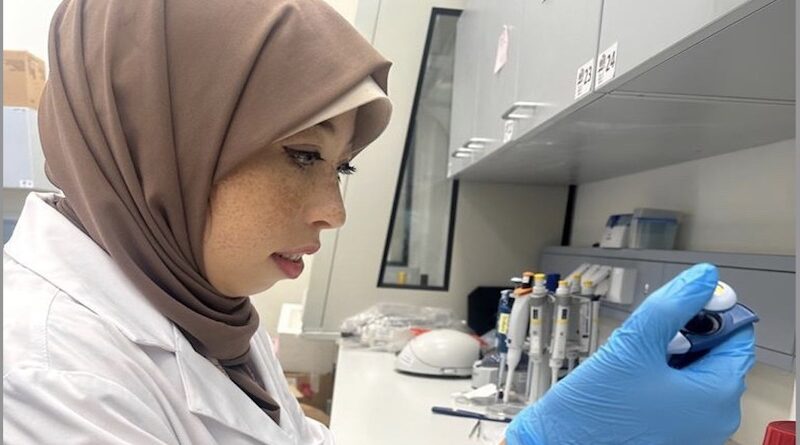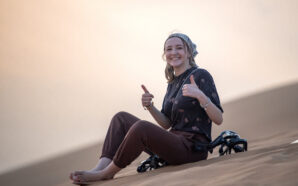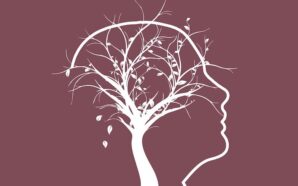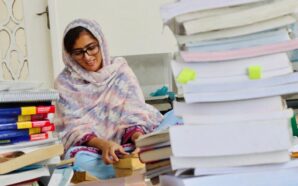The L’Oréal-UNESCO For Women in Science Middle East Regional Young Talents Program, in partnership with Khalifa University of Science and Technology, earlier celebrated a decade of empowering female scientists from the GCC in the fields of Life Sciences, Physical Sciences, Mathematics and Computer Science, who have blazed trails and are changing the landscape of scientific discovery in the region. Since its inception in the GCC in 2014, the program has made prodigious strides in nurturing and furthering the research endeavors of 51 female Arab scientists by awarding endowments totaling AED 3.4 million and supporting their professional growth. Among them are several scientists who have also received international recognition, with five going on to win the International Rising Talents Awards, and another four scientists receiving the L’Oréal-UNESCO For Women in Science International Award, as well. The regional program is part of the L’Oréal-UNESCO’s global For Women in Science initiative that has already recognized over 4,100 phenomenal researchers and more than 127 International Laureates from more than 110 countries since its inception in 1998. For the fifth year in a row, the program has been endorsed by H.E. Sarah Al Amiri, UAE Minister of State for Public Education and Advanced Technology and Chairperson of the UAE Space Agency. H.E. said: “The extraordinary accomplishments and dedication of women scientists in the region has paved the way for progress in various fields, influencing everything from healthcare and technology to environment sustainability and space exploration. Initiative like the one by the Foundation L’Oréal and UNESCO has been empowering female game-changers, encouraging more women into STEM careers, and paving the way toward diversity. Such programs create a necessary foundation in our pursuit for scientific progress, innovation and a more inclusive society.” According to the latest UNESCO Science report, even today, just one in three researchers is a woman, and this drops by nearly half at a senior level. Additionally, less than 4% of women have been awarded a Nobel Prize for Science. These unsettling figures continue to propel the L’Oréal-UNESCO For Women in Science Program, which was established on the ethos that ‘The world needs science and science needs women’. The program was created to break down barriers to progress for women in STEM and provide them with the tools to succeed.
Nadin Nagy Mahmoud Younes has been recognized for her research on the development of low-cost, easy-to-use tests (LFAs) for the early and rapid detection of Norovirus (NoV) and Hepatitis E (HEV).
Tell us about yourself, your academic and professional journey.
I’m Nadin Younes, originally from Egypt, and I’m currently a Ph.D. candidate at Qatar University’s College of Health Sciences. Qatar has been my home since 1999, where I’ve completed my entire educational path, earning my BSc and MSc degrees in Biomedical Sciences from Qatar University in 2016 and 2019, respectively.
During my master’s, I had the opportunity to work as a Graduate Teaching Assistant, which ignited my passion for teaching and mentoring. Subsequently, I joined the Biomedical Research Center (BRC) as a research assistant under the mentorship of Dr. Gheyath K. Nasrallah. Here, I gained valuable hands-on experience in laboratory experiments and developed a keen interest in infectious diseases, particularly in the context of the COVID-19 pandemic. My research focused on serological diagnosis and immune responses among both symptomatic and asymptomatic SARS-CoV-2 patients. In recognition of my dedication to scientific research, I was honored to receive the Graduate Sponsorship Research Award from the Qatar National Research Funds in 2021. This prestigious award provided me with the opportunity to embark on my Ph.D. journey in Biomedical and Pharmaceutical Sciences at Qatar University. To date, I’ve had the privilege of publishing over 35 articles in esteemed scientific journals, contributing to our understanding of critical health issues.
What was the inspiration behind your choice of study and vocation?
My journey into the world of science was sparked by an insatiable curiosity about the human body, a fascination that gripped me from a young age. This profound interest in unraveling life’s mysteries drove me to dive deep into the realm of life sciences. As I embarked on this adventure, I couldn’t ignore the impact of diseases on people’s lives, which drove me to focus on understanding and combating these challenges.
Throughout my school years, I excelled in science-related subjects and eagerly participated in science fairs and competitions. My teachers and mentors recognized my passion and encouraged me to explore scientific topics beyond the classroom curriculum.
In pursuit of my interest in science, I chose to major in biomedical science during my undergraduate studies at Qatar University’s College of Health Sciences. This decision not only provided me with a comprehensive understanding of the intricate workings of biological systems but also instilled in me a strong foundation in scientific research methodologies.
As my journey continued, I pursued a master’s degree in biomedical science at Qatar University as well. Throughout my graduate studies, I actively volunteered in research projects under the supervision of Dr. Gheyath K. Nasrallah to gain hands-on experience in the laboratory. These experiences provided me with a deeper understanding of the scientific process and further fueled my passion for research.
Upon completing my B.Sc. and MSc degrees, a pivotal moment in my academic journey occurred when I was honored with the prestigious Graduate Sponsorship Research Award from the Qatar National Research Funds. This award provided the necessary resources to pursue my Ph.D. in Biomedical and Pharmaceutical Sciences at Qatar University, allowing me to delve even deeper into my research interests.
Today, I am grateful for the opportunities I have been granted and for the unwavering support and encouragement from my mentors and colleagues. My career in science is an ongoing voyage of exploration, discovery, and continuous learning. I am genuinely excited to contribute to the scientific community and inspire future generations to embrace the wonders of science, just as I did at the outset of my journey.
What have been some of the most significant milestones in your professional journey?
My professional journey has been marked by several noteworthy milestones, each contributing to my growth and commitment to scientific research. The completion of my bachelor’s and master’s degrees in biomedical science at Qatar University provided me with a solid foundation in scientific principles and methodologies, laying the essential groundwork for my research career.
In 2021, a turning point in my academic journey occurred when I was honored with the prestigious Graduate Sponsorship Research Award from the Qatar National Research Funds. This award supplied the vital resources necessary to embark on my Ph.D. journey in Biomedical and Pharmaceutical Sciences at Qatar University.
This year, I achieved a significant milestone by securing the first place in the 10th Innovation and Entrepreneurship Annual Contest at Qatar University. Furthermore, I was deeply honored to receive second place in the Graduate Research Award at Qatar University, a recognition that underscored my contributions to the academic and research community.
However, the culmination of my journey came when I was honored to receive the prestigious L’Oréal-UNESCO For Women in Science Middle East award. This esteemed recognition not only validated my unwavering dedication to scientific research but also provided me with invaluable opportunities for collaboration and networking with fellow scientists.
What are some of the challenges that you have faced and how did you overcome them?
One of the most significant challenges I encountered in my career was becoming a mother during the first year of pursuing my Ph.D. This period required me to balance the responsibilities of parenthood while remaining dedicated to my research and studies, presenting a demanding juggling act. I worked tirelessly to ensure my daughter received the attention and care she needed, all while upholding the rigorous standards required for my Ph.D. This experience honed my skills in time management, resilience, and adaptability.
Furthermore, my family, especially my mother, played an unwavering and indispensable role as a source of support during this challenging period. While the demands of motherhood during my initial year of Ph.D. studies were daunting, my family, under my mother’s exceptional support and guidance, played a pivotal role in helping me maintain the delicate balance between my responsibilities as a mother and my commitment to my studies.
These experiences have not only enriched my personal growth but have also reinforced my ability to overcome challenges and maintain unwavering dedication to both motherhood and my academic pursuits. They serve as a reminder that with determination and a strong support system, one can successfully navigate the complexities of life’s journey while pursuing their aspirations.
Do you believe gender has any part to play when it comes to challenges and milestones?
As a woman in the field of science, I firmly believe that gender can indeed play a part in both challenges and milestones. While significant progress has been made in recent years, there remains an underrepresentation of women in scientific careers, especially in the Middle East. Despite strides towards gender equality in education and the workforce, cultural and societal factors can still discourage or limit women’s full participation in scientific fields, presenting gender-related challenges.
I consider myself fortunate to have pursued my educational journey at Qatar University, where I completed my undergraduate and graduate studies and am currently pursuing my Ph.D. This institution, as Qatar’s first university, has played a pivotal role in shaping the educational landscape of the country. It’s noteworthy that when it was established in 1973, there were separate faculties for men and women, illustrating the gender-related challenges that existed. However, over the years, Qatar University has made significant strides in advancing gender equality and empowering women, marking important gender-related milestones.
The increasing enrollment of women in Qatar’s private universities and their growing interest in traditionally male-dominated fields, including engineering and science, signify a positive shift towards a more inclusive and diverse workforce. I take pride in being a part of this transformative journey and pursuing a career in science as a woman in the Middle East, contributing to the ongoing gender-related milestones.
Nevertheless, the path to gender equality in science is an ongoing journey, and I am deeply committed to serving as a role model for young women who aspire to excel in scientific careers. Through education, encouragement, and unwavering support, we can break down gender-related barriers and create more opportunities for women in scientific fields. Every milestone achieved by women in science is not only a personal triumph but also a step towards a more equitable and prosperous future for all.
And most importantly, do you think gender can also play a part when it comes to science in the sense – how you work, analyze, formulate, develop and/or create? Why or why not?
I firmly believe that gender does not play a role in how individuals approach their work or contribute to science in terms of their methods, analyses, formulations, or developments. The scientific method is inherently impartial to gender, as it relies on objective, evidence-based inquiry. The quality of research is determined by the rigor and validity of one’s methods and findings, rather than any gender-related factors.
In the scientific community, both genders bring unique perspectives, ideas, and approaches to the table. These differences should be celebrated, as they enrich scientific discourse and lead to more holistic and innovative solutions to complex problems.
However, it is essential to acknowledge that gender biases have historically persisted in STEM fields, creating hurdles for women and underrepresented groups. While significant progress towards gender equality in science is evident, challenges remain. It is our collective responsibility to continue advocating for equal opportunities, dismantling gender-based barriers, and fostering inclusivity in scientific research and academia.
We would love to know more about your work, the potential impact, and the promise it holds.
The challenges faced by the healthcare sector and diagnostic laboratories have underscored the critical need for rapid infectious agent detection methods to enhance patient care. My research project centers on the development of two lateral flow assays (LFAs) for the early and rapid detection of Norovirus (NoV) and Hepatitis E (HEV). These foodborne pathogens pose significant health threats globally, leading to outbreaks and severe health consequences.
Norovirus, recognized for its highly contagious nature, frequently triggers extensive outbreaks worldwide, resulting in severe gastroenteritis. On the other hand, Hepatitis E can lead to acute liver inflammation, posing a significant risk, particularly for pregnant women. Moreover, the potential transmission of HEV through blood transfusions adds to the urgency of early detection.
The potential impact of my research extends to both Qatar and the broader global community. Our primary goal is to pioneer the creation of highly sensitive, cost-effective, and user-friendly LFAs, with the aim of revolutionizing point-of-care diagnostics. This innovation will facilitate the timely detection and containment of NoV and HEV, especially in regions with limited healthcare resources, ultimately bolstering disease control efforts and saving lives.
Furthermore, these LFAs hold potential applications beyond clinical settings. They can be adapted for testing food and environmental samples, enhancing food safety and public health management. As infectious diseases know no boundaries, our research contributes to global health security by providing accessible tools for rapid disease detection and monitoring. In essence, my research project seeks to strengthen disease control, enhance human health, and advance food and water safety, with benefits extending to Qatar and making a meaningful global impact.
What does this recognition mean to you and how does it enable and empower you in your journey?
Winning the L’Oréal-UNESCO For Women in Science award represents an extraordinary milestone in my life, one that carries profound implications for both my career and personal journey.
This recognition validates the years of hard work and dedication I’ve poured into my scientific research. It reaffirms my belief in the significance of the work I’m doing in the field of infectious diseases and diagnostics. It has given me a significant boost of confidence, and that my contributions to science are genuinely valued.
However, this recognition is not just about me; it carries a broader responsibility. As a female scientist, this win adds an extra layer of duty. It feels like I’ve been entrusted with a torch to light the way for other women in STEM, especially in the Middle East. My goal is to serve as an inspiration for more women to embark on rewarding careers in STEM and make substantial contributions to their respective fields.
On a personal level, this achievement has filled me with a sense of pride and gratitude. It has brought honor not only to me but also to my family, mentors, colleagues, and Qatar. It serves as a reminder of the unwavering support and encouragement I have received throughout my journey.
Any last words?
I take immense pride in representing two countries: Qatar, my second home, where I’ve had the privilege of pursuing my academic and scientific journey, and Egypt, my cherished homeland. Qatar has played distinct and crucial roles in shaping my personal and academic growth, while Egypt, even though it may not have directly contributed to my academic path, remains a significant part of my identity and heritage. I am deeply honored to carry their legacies forward in my scientific pursuits.
Also, I would like to take a moment to convey my heartfelt appreciation to the incredible support network that has been the bedrock of my journey. My family’s unwavering encouragement and belief in my potential have been a constant source of motivation and inspiration.
In addition, I am profoundly thankful for the exceptional guidance and mentorship provided by my PhD supervisor, Dr. Gheyath K. Nasrallah. His unwavering support and faith in my abilities have played a pivotal role in my academic accomplishments.
Furthermore, I feel incredibly fortunate to be part of the vibrant academic community within the Department of Biomedical Sciences at the College of Health Sciences, led by Dr. Maha Al Asmakh as the Head and under the esteemed leadership of Dr. Hanan Abdul Rahim as the Dean. The nurturing and supportive environment within this college have significantly contributed to my academic and research endeavors.
My research journey at the Biomedical Research Center (BRC), under the visionary leadership of Dr. Asma al Thani as the Director, has been an extraordinary privilege. The BRC not only provided cutting-edge research equipment but also fostered a culture of collaboration and innovation, allowing me to push the boundaries of scientific knowledge.
Lastly, I extend my heartfelt gratitude to the Qatar National Research Fund for granting me the Graduate Sponsorship Research Award, which has made my Ph.D. pursuit possible. This opportunity has been transformative in my academic and scientific journey, and I am profoundly grateful for their invaluable support.











